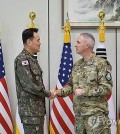- California Assembly OKs highest minimum wage in nation
- S. Korea unveils first graphic cigarette warnings
- US joins with South Korea, Japan in bid to deter North Korea
- LPGA golfer Chun In-gee finally back in action
- S. Korea won’t be top seed in final World Cup qualification round
- US men’s soccer misses 2nd straight Olympics
- US back on track in qualifying with 4-0 win over Guatemala
- High-intensity workout injuries spawn cottage industry
- CDC expands range of Zika mosquitoes into parts of Northeast
- Who knew? ‘The Walking Dead’ is helping families connect
S. Korea decides to ease regulations on drones, biotech, autonomous vehicles

President Park Geun-hye speaks during a meeting of senior government officials in charge of regulatory reform at Cheong Wa Dae on May 18, 2016. (Yonhap)
SEOUL (Yonhap) — South Korea on Wednesday said it will move to lift a series of regulations covering drones, the biotech industry, autonomous vehicles and other areas with good growth potential, as part of a broader deregulatory campaign aimed at boosting economic growth.
The decision was finalized at a meeting of senior government officials in charge of regulatory reform. President Park Geun-hye presided over the meeting — the fifth of its kind — at the presidential office Cheong Wa Dae.
The panel on investment in new industries, affiliated with the Office for Government Policy Coordination, had received 151 deregulation recommendations from business circles. The government decided to address 141 of them, or 93 percent of the total.
During her opening remarks, Park said that deregulation is at the heart of her government’s endeavors to prop up economic growth and create jobs. She also called for “bold” steps to remove regulations that impede the growth of new industries.
“Regulatory reform gives courage and hope to the struggling companies,” she said. “There shouldn’t be any case in which businesses have to waste their time and money due to (unwarranted) regulations.”
Park also directed her government to speed up the process of addressing an issue involving Kakao Corp., the operator of South Korea’s top mobile messenger KakaoTalk.
The company has complained of new regulations it has faced since it was designated last month as a large business group subject to stricter state oversight. The regulations are designed to keep conglomerates from expanding their business areas indiscriminately.
“The government exists to help private firms capitalize on its full potential and reach out to the world by removing unnecessary regulations,” she said. “This (deregulation effort) needs to pick up speed.”
Under Wednesday’s decision, the government will approve all drone-related businesses except for those that may undermine the safety of citizens or national security.
Test operations of self-driving cars, which had previously been allowed only in limited regions, can now be conducted across the entire nation. Small electric cars and other future vehicles will also be allowed to run on local roads should they meet the safety requirements that foreign governments have set.
In a world first, the country will build a nationwide network exclusively for the Internet of Things (IoT). And in an emergency, 3-D printers can be employed to make medical devices under the direction of doctors.
The government also said that to boost the use of big data, it will ease rules on the protection of private information, which has been cited as a major stumbling block to the development of new cutting-edge industries.
Rules on the use of satellite-based location data will be relaxed to a certain extent to support related businesses.
The government, moreover, decided to set up guidelines by next month on the extent to which wearable smart gadgets can collect information on the body, as local firms have complained about the absence of such guidelines.
Seoul has held five rounds of top-level deregulation meetings since March 2014 as Park pushes for her regulatory reform drive to address local and foreign firms’ complaints, attract investment and revitalize the economy.











